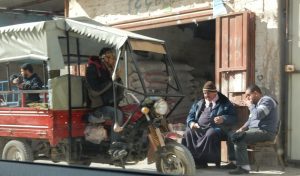 Humanitarian workers in Gaza have a unique window on the impact of the political and economic realities on Gazans and I am meeting with such a worker whose passion and dedication brings me to tears. He says that there have been some successes, the most vulnerable have basic services, food, water filters, some psychological interventions and assistance to children, but people are basically hanging on and unable to be independent. There is a huge dependency on humanitarian aid and massive displacement due to the destruction of housing, the cumulative effect of three major attacks in six years. 18,000 homes are still flattened, 55,000 people are waiting for their homes to be rebuilt; there is a critical lack of funding and crushing Israeli restrictions on bringing in necessary materials. That combination is making it impossible for many people to rebuild.
Humanitarian workers in Gaza have a unique window on the impact of the political and economic realities on Gazans and I am meeting with such a worker whose passion and dedication brings me to tears. He says that there have been some successes, the most vulnerable have basic services, food, water filters, some psychological interventions and assistance to children, but people are basically hanging on and unable to be independent. There is a huge dependency on humanitarian aid and massive displacement due to the destruction of housing, the cumulative effect of three major attacks in six years. 18,000 homes are still flattened, 55,000 people are waiting for their homes to be rebuilt; there is a critical lack of funding and crushing Israeli restrictions on bringing in necessary materials. That combination is making it impossible for many people to rebuild.
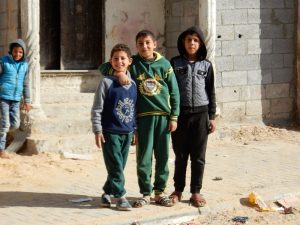
The homeless are living in rented accommodations with UN funding, or with host families, in caravans (a la Katrina only worse), and makeshift structures. This is the third cold winter in the caravans and there is an attempt to find more durable solutions for these families, these people are suffering unnecessarily. He notes that there is no reason why Israel should not allow materials for rebuilding homes. There is plenty around to build tunnels, (the Israeli excuse for the restrictions), so these policies are strictly punitive for the general population.
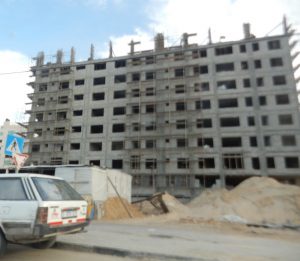
Additionally, 95% of the water is not drinkable. He asks, “How is this related to Israeli security? How will Israeli security be threatened if children drink clean water or farmers export strawberries or build houses, all under UN supervision? The people are still being left behind.”
The most immediate crisis today is electricity, a good day has eight to twelve hours, but these days the maximum is more like six hours. “Everything is reduced to a minimum, heating is a minimum, water is a minimum. So who is to blame? Hamas? PA? All of them?” He states that the people are too weak to be heard and to challenge all of the responsible parties, that there needs to be a political solution. It could be solved quickly with the political will along with medical referrals, access to the sea, and to farmlands. “Our problem is politics, but it presents as a humanitarian crisis.” People’s days are consumed with survival and covering basic needs, like obtaining cooking gas. Even he has difficulty despite all the connections and knowledge that he has. In this setting, “no one will mention Palestine or basic rights.”
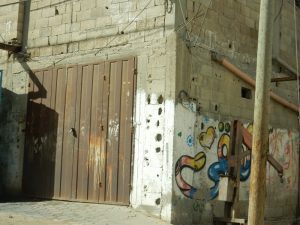
Gazans need permits for students or patients to leave or to develop a clean water supply. “The problems are fixable. Someone decides how a Gazan day will go. If the Karem Crossing was open [for supplies from Israel] we would have gotten fuel and Gazans would have had more electricity, but the crossing was closed.” This is because of Hamas, the PA, and Israel, “but the people pay a heavy price, more than 50% are kids, they never voted for anyone or met an Israeli. They are still forced into depravation, unemployment, and aid dependency. The Israelis are giving Hamas a secret weapon.” There are an enormous number of educated unemployed youth. “Hamas recruits them cheaply to build tunnels when they could do better. The solution is easy. Open Gaza up. People should be busy with something else.”
He notes that in 2013 there was a building boom and the lowest number of bombings or trouble. The tunnels were open, the economy was flourishing (on Gazan terms), people wanted to live their lives, they turned away from resistance. Then everything turned around when the tunnels closed and Israel keeps repeating this vicious cycle. “People need a chance to live their lives. This cycle will be harmful to Israelis as well.”
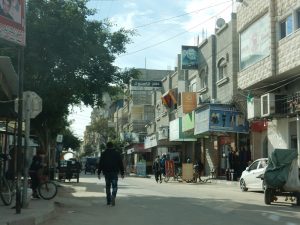
“People should think about how to look at Gaza as an opportunity not a problem. Gazan youth should be making production and functional for a good future, this will bring peace, not tanks and guns. Food rations will not provide peace; compromising people’s dignity will never bring peace; depriving people of basic rights, this will not bring peace. When Israel denies women with cancer chemotherapy and radiation, how will this bring peace? Or a sick baby cannot be accompanied by his mom or dad, how will this challenge Israeli security?”
“This is the story, all about giving the humans their dignity, their human perception and dignity. Every day Israel pushes people to compromise their dignity. Lose electricity, compromise their dignity. Resort to primitive means of cooking, compromise their dignity. When to queue for food rations, compromise their dignity.”
We turn to US politics and he is not too scared of Trump. He “will bring consequences to the US, people will try to stop him and see through his policies. He will not be protective to Israel. If you feed the violence you will create more violence.” He feels that Trump will “first hit American society, it might become worse in Palestine.” As the situation becomes worse in the US, he will bring “a certain divide to Americans and then they will be busy with their own internal issues so he will leave us alone.” He reminds me that Defense Minister Lieberman famously said, “Just give me two days and I will eliminate Haniya (of Hamas) and bring back the captive soldiers. They talk big. Trump said he will help Israel bring down the recent UN resolution (condemning settlements). Let’s see how successful he will be on the 21st of January.”
This humanitarian worker sees his job as working to preserve the “humanitarian space that is entitled to people. It is not an easy job because of the necessity of aid and being able to support people. Need to snatch it, fight for it. I am spending hours and days on education, negotiating, fighting to make sure that you are provided with humanitarian space. It depends on how strong and active you are.”
“It is not burning us out. What burns us out is repetition of what we are doing, the endless journey, never never the last round. Either by the Israeli bulldozers, the lack of coordination with Ramallah, the mission is never accomplished. People are suffering from food insecurity, they can’t access their land. If they do, they can’t access resources. If they do, then there are land restrictions and they are afraid of rockets. If they do, they are not sure if the harvest will be a good profit at a local market because Israel will not allow the food to go outside. It is endless.”
“That is the source of our frustration. We should have burnt out a long time ago. We believe the people in Gaza deserve that we just keep working to keep them standing. In Gaza we are supporting 1.3 million people.”
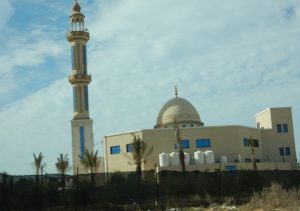
But he notes that he is scared. “The last summer a guy from an NGO was accused of financing Hamas. This caused a huge amount of trouble for humanitarians, we are standing on our toes, accused by all parties, there is so much polarization.” For instance, if he is seen as understanding some Israeli position, then Hamas accuses him of being a collaborator. Our hands are not as free as we want, but we have to speak with everybody. We only see the situation is going bad to worse, people are locked in. How can they see a positive change, stuck with the rubble, food needs, psychological stress. It is getting really worse, getting to exploding point.” Because electricity is a seasonal problem, he does not think this current crisis will be the trigger. “People are coping well with power cuts, batteries, it is not the number one worry. The number one worry is stopping the escalation. In August Israel massively showered Gaza with bombs, oh my God, what is going to happen? Stop any possible escalation. We walk a stream into a new violence cycle if the situation doesn’t change.”
I ask about the need for caring for the care giver and he says unfortunately this is not happening in Gaza. “We thought of it, an individual manner. Everyone finds his comforting resources but there is no one program designed to protect humanitarians. Each agency has its own programs, the UN Office for the Coordination of Humanitarian Affairs (OCHA) does debriefing sessions and the UN has a stress counselor. We use them. We try to get our families to use it as well.”
He states that his family is fine. He has three children, two have lived through three wars. “They are sort of fine, can easily remember it, but it is not as much a part of their life as it used to be. They are stressed because they are stuck. My thirteen year old son visited Jerusalem once in 2015, coordinated by the US consulate. It was a chance to see Israel and Jerusalem, it was a fantastic experience for him. There is Israel, Jerusalem, West Bank, his world was only Gaza, war. He never believed that in Israel there is more than this; they have markets, they have schools, they are speaking Hebrew without a uniform. He saw clean streets.”
My friend has been unable to get him another permit and his son is really upset. He asks repeatedly, “Why Israel occupying Palestine? Why Erez checkpoint? Why permits? Why no electricity? Why permits? All these questions come to our dinner table at least once a week. He changed the minute he saw that in Israel there is more than the army. People can coexist, talk, create common grounds. Being deprived of this, Israel keeps reacting very violently. I don’t know how his future will be. I try to keep my kids away from polarization. They are at the American School. How will they be reacting when they reach seventeen? Who will grab them? Peace or violence? But peace is too weak here, I am really afraid, need to give these children a chance for the sake of the Gazan children and the Israeli children. We will not go anywhere, many of our neighbors move to Canada, Cairo.”
“We can move but this is our home, we will never leave home even if we move temporarily to another country. We are Palestinian and we deserve Palestine. But Israelis will also remain, we have to find a way to stay together. All their attempt to kill us, we will stay, as simple as this. That’s it.” His third child is only three months old. “It is very hard and emotional to be a father here, bringing kids to this very difficult situation. I want to be hopeful. My wife tries to be the same way, grow up normally, not an easy stuff, but you have to try. There is no home better than home. You will never get bored of home. This is human nature.”
“If you are forced to leave your home and someone is happy that you left, then there is [a sense of] defeat. We are only Palestinians. In Israel everyone came from another home. Yesterday in Israeli media, they were talking about the killing of soldiers. Two victims are American citizens. If they are American citizens, they shouldn’t be in an Israeli uniform. He hit them only because they look like Israeli soldiers. If you are an American citizen, then go home.”
He deplores the fact that Israeli leaders “try to frame us as ISIS, they need to frame Palestinian resistance into ISIS and link to [attacks in] Germany and Nice and global terrorism.” Interestingly for me, he is not worried about ISIS taking hold in Gaza. “Hamas is not that extremist, almost liberals. Hamas police come and smoke sheesha in this hotel.” He classifies Hamas as the far right of liberals. “It is haram for women to go without a scarf and for men to smoke or women to be with men, but this is tolerated here. If someone tried to harass us, he would be imprisoned. Hamas is fighting ISIS and Salafists, they arrested 200 of them, putting them under extreme pressure. In 2008 a guy tried to declare a caliphate in Rafa and he was killed with 28 supporters. There is zero tolerance for Dai’sh. The world doesn’t want to see that. Hamas is presented as extremist and fundamentalist.”
“The society went conservative maybe because Hamas delivers a speech every Friday and has strong influence in people’s thinking and in school But there is no law to wear a scarf, but in school your teacher will tell you it is inappropriate not to wear a scarf. This is a society rule rather than a law.” He agrees that there are so many problems around gender and women’s needs. “Hamas is awful and problematic, but don’t put everything on this factor. Poverty is a factor, unemployment, many women put the niqab on to grab attention to Hamas to get assistance. Her husband is looking for a job with Hamas or the police and they want a good record. When society feels helpless and hopeless, it goes to the unknown stuff, this is all about human freedom.”
He asks me what I would do if I lost my keys. “If you went home and tomorrow you want to leave home but you lost your keys, you shout, climb out the window, try to get a response. If no one pays attention, you will shout louder. Ultimately you will smash the door. We want to smash the door, we want the world to notice us when the world is turning completely blind and deaf. But now you want to blame us. We are too weak to be blamed. Israel imposed the blockade hoping that people will topple Hamas. I you want to achieve this, how come every day you weaken the people, cut the water, hit the schools, police stations, roads, homes. How can that topple Hamas? If my children do not have food, I will go to fight for food. The blockade is super counterproductive.”
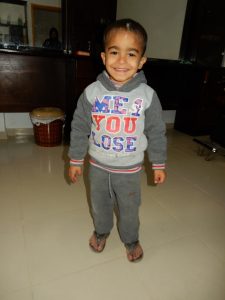
He has to leave, but he wants me to know, “Much of this is the responsibility of the international community. The UN resolution [condemning settlements] was so fantastic to me. Tiny Israel is trying to punish the whole world. How can a country get such power?”
For more information from OCHA in 2015:
https://alicerothchild.com/2015/03/march-27-2015-this-could-be-my-reality/